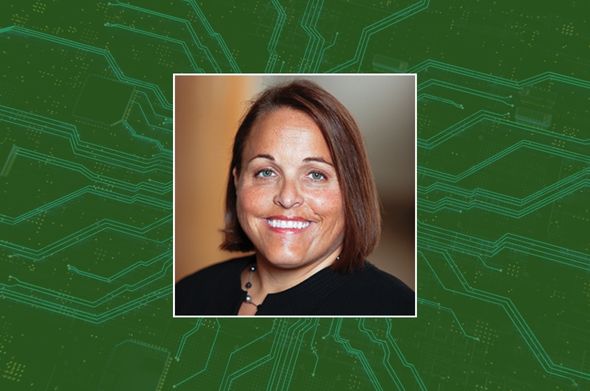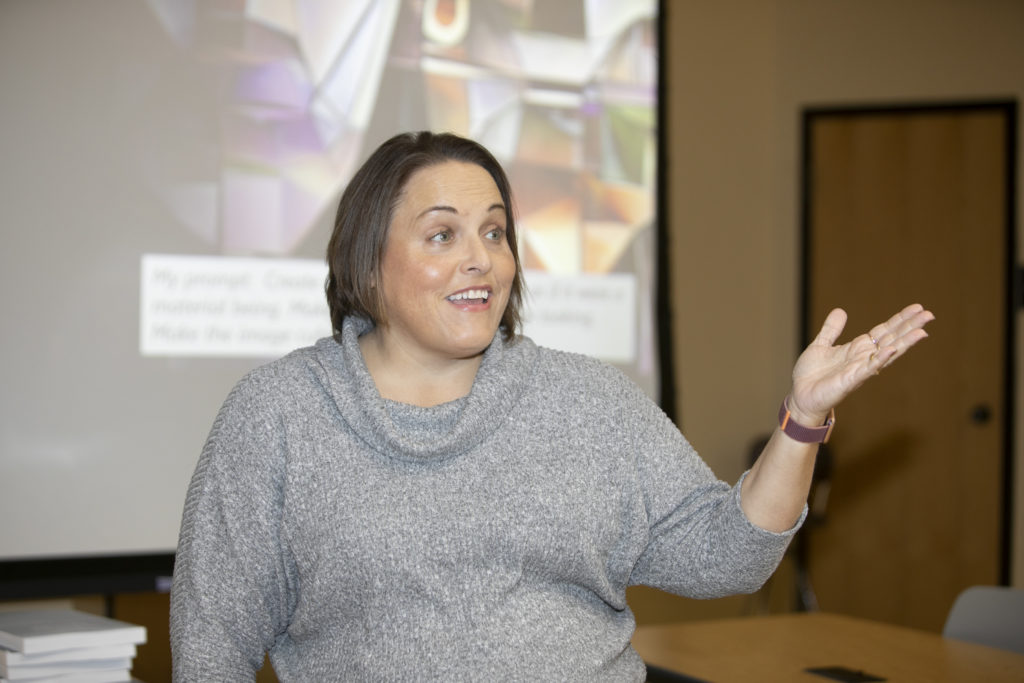AALS Tech Section Honors Dr. Davis for Innovation on Tech & Legal Ed

From embracing virtual learning during the pandemic to inspiring colleagues to reimagine legal education in the age of artificial intelligence, Dr. Kirsten Davis is leading important conversations about the ways tech transforms how we teach law.
Earlier this month, Davis, a Professor of Law at Stetson and the college’s Faculty Director of Online Legal Education Strategies, was an inaugural recipient of the Association of American Law Schools Section on Technology, Law, & Legal Education Technology Mentorship Award.
The Section’s award announcement to its members described Davis a “a respected authority in legal ethics and communication” who “has made significant strides in integrating technology into legal education,” particularly with regard to the effects A.I. is having on the field.
“Through her impactful pedagogy, scholarly work, and direct mentorship, she has been a catalyst in helping students and peers understand and adapt to the rapidly evolving landscape in practice,” the Section announcement said. “Her initiatives have set a benchmark for technology mentorship within legal academia.”
Advancing the conversation
To be eligible for the award, nominees are required to have made notable efforts to help colleagues navigate the changing technology landscape, such as workshops, scholarship, or events aiming to share insights about emerging tech and offer mentees hands-on opportunities to apply what they’ve learned.
Law Professor Ashley Krenelka-Chase nominated Davis for the AALS award. She said she was motivated to do so because Davis works tirelessly to share her knowledge and understanding of emerging technologies – specifically the proliferation of Generative A.I. programs like Chat GPT.
“Her mentorship has helped people feel more comfortable with what they do and don’t know about using this technology in their classrooms and has allowed all of us to think about the use of generative A.I. and other technologies beyond the black and white in which it is often portrayed,” Krenelka-Chase said.
How it started: Adapting to The New Normal
In 2020, as education institutions everywhere grappled with how to ensure learning continued amid a global pandemic, Davis sprang into action.
She developed tutorials for colleagues who were new to virtual platforms like Zoom, created Amazon shopping lists to help them outfit their home offices with lighting and audio equipment, and more.
“From Zoom to working with Canvas to helping teaching assistants get up to speed on how to support online teaching, we were really just in survival mode in that first bit,” she said.
For that work, the university gave Davis an award for Covid-era innovation.
As the campus transitioned to the learning management software Canvas, Davis worked with Academic Technology Manager Julie Kitzmiller and faculty members Elizabeth Berenguer and Ashley Krenelka Chase on a program to train faculty and staff on the platform.
Sparking New Conversations about A.I.
As ChatGPT and other generative artificial intelligence began to grab headlines in late 2022, Davis – on sabbatical at the time – jumped at the chance to explore its implications for law schools.
“This was the moment I’ve been waiting on my whole career: the opportunity to study technology that might represent a paradigmatic shift for writing and researching the law,” Davis said.
Realizing the likely impact generative A.I. was about to have on legal education – especially legal writing – Davis reached out to colleagues on a listserv read by legal-writing experts across the country and invited them to join a national online conversation, the Generative A.I. and Legal Writing Convo Group.

“I sent out an invitation and faculty started joining on Zoom. We talked about our concerns: Would legal writing classes need new outcomes?” Davis said. “Would faculty need new writing assessment practices? What kind of academic integrity policies should we have with generative AI in the mix? Do we need new curriculum, exercises, and assignments, and what would they look like?”
The group has grown from under 30 members in May 2023 to nearly 300 as of January 2024. Davis has since spoken on generative A.I. and legal writing at law schools at Georgetown, Rutgers, Temple, and Southwestern and will speak at the University of Baltimore in April.
Assessing A.I.’s new role in the classroom & beyond
Those conversations encouraged others to ask questions about how generative A.I. is changing legal education. Davis said developing new approaches to student assessment will be particularly important. Evaluating legal writing assignments has long been seen as a way to evaluate not only the skill of communication but also underlying lawyering skills like legal reasoning. Students’ use of generative A.I. to write papers may change that assumption, which could mean that new ways of assessing skills need to develop.
“I think from a legal education perspective, faculty have to ask, what does the world of lawyering look like for our students three, five, ten years from now?” Davis said. “How are we going to prepare them to navigate a practice world with unprecedented writing technology? Our responses to these questions are going be important.”
The future ubiquity of generative A.I. means law schools need to consider right now whether to teach students prompt engineering skills – and how to evaluate and refine the text A.I. generates, she said. The legal profession will also likely see significant impacts, such as changes to staffing models and billing practices in an environment where legal documents can be generated and refined in a fraction of the time it has historically taken, Davis said.
One question Davis is frequently asked is whether artificial intelligence will eliminate the need for lawyers.
“The discussion of the end of lawyering has been going on for decades, Davis said. “So this question is not something entirely new. Generative A.I. changes the calculus, but I think clients and the legal system will always need careful, smart, lawyers with good judgment and even better ideas who can make good use of technology.”
See Dr. Davis’s full bio.
Post date: Jan. 30, 2024
Media contact: Kate Bradshaw
[email protected] | 727-430-1580